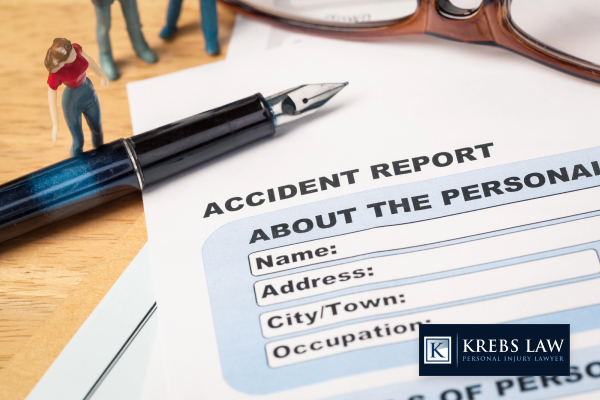This page was written, edited, reviewed & approved by JR Krebs following our comprehensive editorial guidelines. JR Krebs, the Founding Partner, has years of legal experience as a bankruptcy attorney. Our last modified date shows when this page was last reviewed.

Understanding the timeframe to report a car accident to your insurance company is crucial for any driver. Immediately following an auto accident, you may be dealing with stress, injuries, or even just the shock of the event, which can delay your next steps.
However, knowing when and how to file a car insurance claim can significantly affect the outcome of your claim. Most insurance companies have specific guidelines that you need to follow to ensure your claim is processed smoothly.
The timeline for reporting can vary based on your insurance provider and specific policy. Generally, insurers advise that you report any car accident within 24 to 48 hours if possible.
At Krebs Law, we have experience with car insurance claims. We would also be happy to help you with your car accident insurance claim.
Learn more about what car insurance claims require below. Then, contact us for help with your accident claims.
Most insurance companies expect you to report a car accident as soon as it happens. The general advice is to contact your insurance agent within 24 to 48 hours of the accident.
This timeframe helps ensure that the details of the incident are accurately recorded and that any evidence is fresh. Reporting within this window can also facilitate a smoother claims process. It ensures that important details are not forgotten over time.
Reporting your accident promptly allows your insurance provider to begin investigating your claim immediately. This is crucial, especially if there are disputes about who is at fault or the extent of the damages. An early report helps preserve evidence like photos from the scene or witness statements.
These can be pivotal in resolving your car insurance claim efficiently. Furthermore, immediate reporting demonstrates your commitment to following the terms of your insurance policy. This can influence the processing of your claim positively.

One of the key reasons to report accidents promptly is to avoid the risk of your claim being denied. Insurance companies require timely notifications. This helps them gather accurate information and assess damages effectively.
Delaying your accident report can make it harder for your insurer to verify the facts or link the damage directly to the accident. This could lead to a denial of your insurance claim.
A timely report also ensures that your insurance coverage is utilized effectively. It lets insurers handle repair costs, medical expenses, or other liabilities.
In addition, in cases where another party is at fault, your insurer can initiate recovery processes from the other party's insurance provider sooner. This ensures your claim is acknowledged and processed with all due financial considerations.
If you don't report your car accident in a timely manner, you could face several negative consequences. Your insurance company might penalize you by reducing your coverage amount or denying your claim altogether. This can leave you financially responsible for any repair and medical expenses, which can be significantly burdensome.
Failing to report your accident promptly can lead to claim denial or reduced coverage. Insurance companies have strict guidelines about reporting accidents; not adhering to these can be seen as a breach of your insurance policy terms.
Suppose the insurance provider believes that the delay in reporting affected their ability to investigate or compromised the accuracy of the claim. In that case, they may reduce the payout or deny the claim, leaving you to cover out-of-pocket expenses.
When you sign up for car insurance, you agree to the terms laid out in your insurance policy, which typically includes a clause requiring prompt reporting of any accidents.
Failing to adhere to this requirement can be considered a violation of your policy terms. Such violations can not only affect your current claim but could also impact your future premiums or the renewal of your policy.
If your accident involves injuries or significant property damage, the legal implications of not reporting can be severe.
Depending on your location, there might be legal requirements to file a police report or notify local authorities within a certain period after an accident.
Failure to comply with these regulations can result in fines, legal penalties, or even criminal charges, especially if the accident causes injuries or fatalities.

When you're involved in a car accident, knowing how to properly report it to your insurance company is crucial. Timely and accurate reporting can help you avoid delays in processing your claim and ensure you receive the compensation you're entitled to.
Follow these steps to make sure you're handling the situation correctly and efficiently.
Immediately check if anyone involved in the car crash is injured. If there are injuries, call emergency services before doing anything else.
Move to a safe location to prevent further damage or injuries. Turn on your hazard lights and set up emergency cones if available.
Take detailed photos of the accident, including all vehicles involved, visible damages, and road conditions. This visual evidence can be crucial for your claim.
Collect contact and insurance information from all other drivers involved, as well as names and contact details of witnesses.
Contact your insurance agent to report the accident as soon as possible. Please provide them with all the details and the evidence you have gathered.
If required by law or requested by your insurance provider, file a police report. This document can be vital for the processing of your claim.
Follow up. Keep in touch with your insurance provider to track the status of your claim. Respond to any requests for additional information or documentation promptly.
When reporting a car accident to your insurance company, it's essential to avoid common mistakes that could jeopardize your claim. By being mindful of these potential errors, you can ensure a smoother process and improve your chances of a successful outcome.
Here are some key mistakes to avoid.

While the general rule is to report accidents promptly, there are exceptions where reporting might be delayed. Insurance companies generally recognize these exceptions, which can include situations where the involved parties are physically unable to report the accident immediately.
In cases where severe injuries or hospitalization occur, the priority is medical care, not immediately reporting the accident. Most insurance companies understand these circumstances and will allow delays in these instances.
It's crucial, however, to report the accident as soon as possible, ideally by a family member or legal representative if the injured party is unable to do so.
If you or another party involved in the accident is unconscious or experiencing a medical emergency that prevents immediate reporting, insurers typically consider these valid reasons for delayed reporting.
Once you or the affected individual is stable, the accident should be reported as soon as possible to avoid any complications with the insurance claim.
Law enforcement officials may report accidents to insurance providers, especially in cases involving significant damages or injuries.
In such cases, it is essential to obtain a copy of the police report and ensure that your insurance company has received all the necessary information from the authorities.
After a car accident, dealing with insurance claims can be overwhelming, especially if you're facing disputes or significant damages.
Hiring a lawyer can provide valuable support during this process, ensuring your rights are protected and your claim is handled efficiently.
Here are several ways a lawyer can assist with your insurance claims after a car accident.

If you've been involved in a car accident, seeking professional legal guidance is crucial. At Krebs Law, our Tuscaloosa car accident lawyer is here to help you understand your legal rights and ensure that your insurance claims are handled properly. You can get personalized advice tailored to your situation by scheduling a free case consultation.
Contact us today to schedule a free consultation.

J.R. is dedicated to providing personalized representation, avoiding a one-size-fits-all approach. He tailors his strategy to the unique challenges and needs of each client and case, ensuring focused and individualized attention.
His practice mainly covers Plaintiff’s Personal Injury, including car and 18-wheeler accidents, slips and falls, dog bites, defective products, and wrongful death. He also handles commercial disputes on contingency, with experience in contracts, construction, and probate. For any dispute headed toward litigation, J.R. develops an aggressive strategy to maximize your recovery through negotiation, arbitration, or trial.
"*" indicates required fields